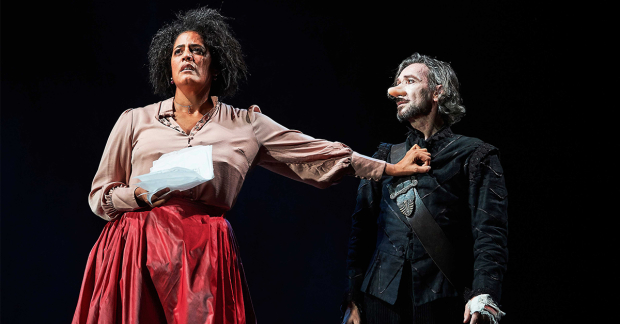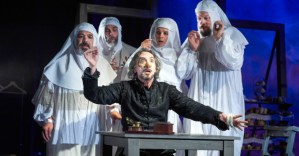Review: Cyrano (Bristol Old Vic)
Peter Oswald writes a new stage adaptation for artistic director Tom Morris

© Geraint Lewis
The source of a whole host of modern adaptations, Edmond de Rostand's 1897 Cyrano de Bergerac is one of the classic, timeless tales of nameless, misplaced love. It is a tussle between the importance of body versus the importance of soul (our hero Cyrano's physique is blighted by a very large proboscis but his wit and sense of romance is second to none), and it is, when told well, a delight.
It's great therefore that playwright and poet Peter Oswald has penned a new stage adaptation of the original French text for director Tom Morris at the Bristol Old Vic. But while this version's heart is in the right place, its nose is a little out of joint.
Morris has gathered a strong and witty troupe here, including Bristol Old Vic, Kneehigh and Wise Children regulars such as Giles King, Felix Hayes and Sara Powell, and there's a DIY aesthetic surrounding the tight-knit group of performers, who shift characters and costumes with surprising speed and ease. Oswald has added a starting frame to the play, bringing the final scene to the beginning and making us jump back in time to watch the story of Roxane as she is enticed by Cyrano's fellow soldier Christian on the basis of his looks, but who falls in love with him through his letters. It is the story's ultimate tragedy that the man behind those letters is poor old big-honked Cyrano, who knows (sorry) he has no chance that Roxane will look past his hooter and so lives love vicariously through his friend Christian.
Oswald's adaptation is in verse like the original but with added modern twists and turns. Its problem is that it never manages to present our hero in his true tragic light. Cyrano is a contradiction: vulnerable and self-conscious, he is also a beacon of confidence with a disarming array of talents. This opposition overshadows the character on stage here too much and we're left unsure quite how to take our hero. He's too proud for our pity.
And Morris' staging, which plays to an ensemble's strength, also doesn't allow the key moments to breathe. The core scene in the bakery, where Cyrano's hopes that Roxane loves him back are crushed, misses the depth of tragedy. Part of the problem is that there's just too much going on, from costume and scene changes to songs and verse. Tristan Sturrock has some nicely pitched moments as Cyrano – he makes the scene outside Roxane's window, where, under cover of darkness, he is able to profess his true feelings, land beautifully. But those moments are too often flung aside in favour of some quip or sword fight.
And more focus is needed on the delivery and emphasis of the verse, which gets lost too often in the occasionally complex staging. It's a night that's never less than intriguing and at its best is an enjoyable romp. But the figure of Cyrano needs to make the transition from comedy to tragedy and here that's just not quite on the nose.



















